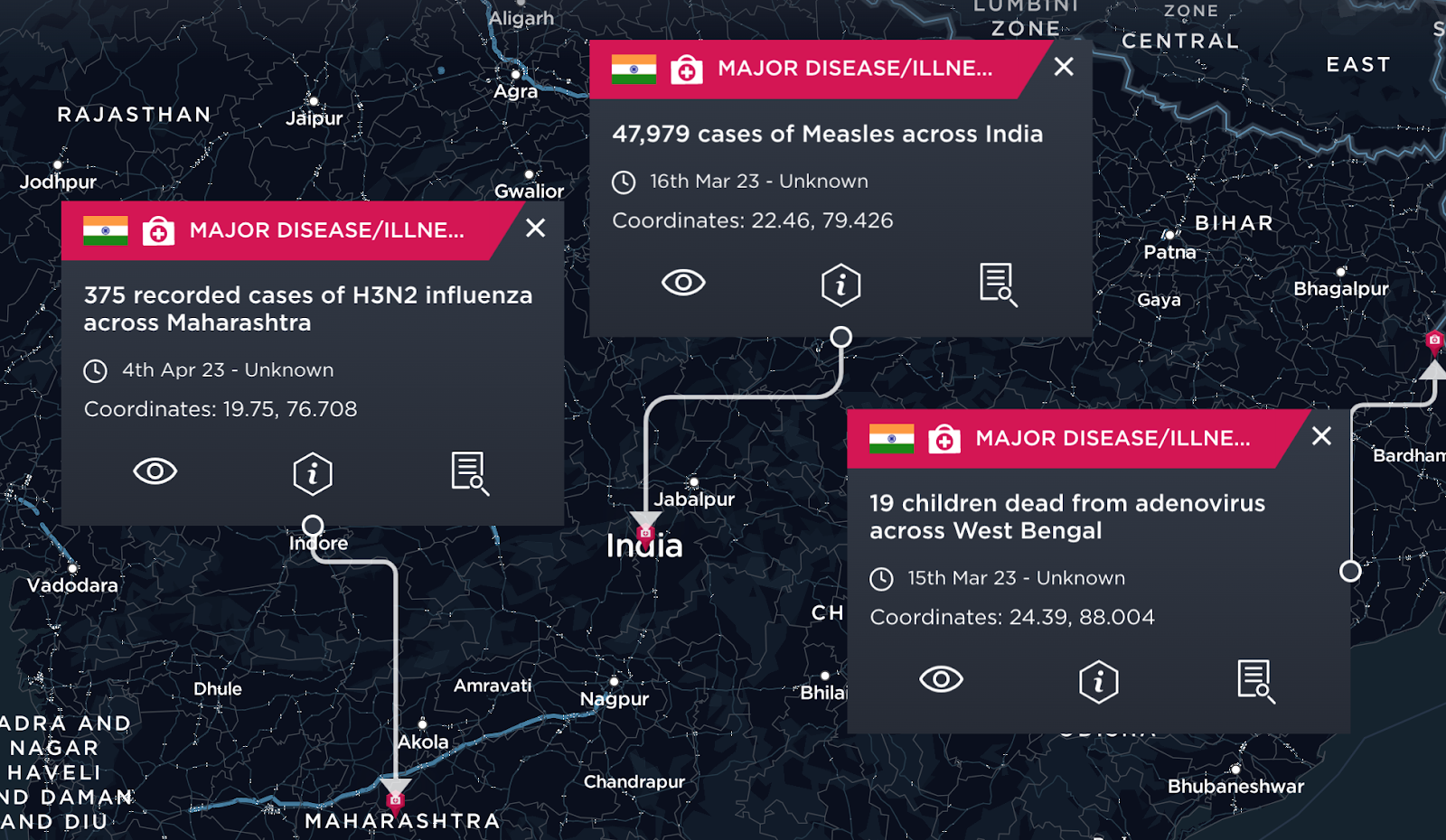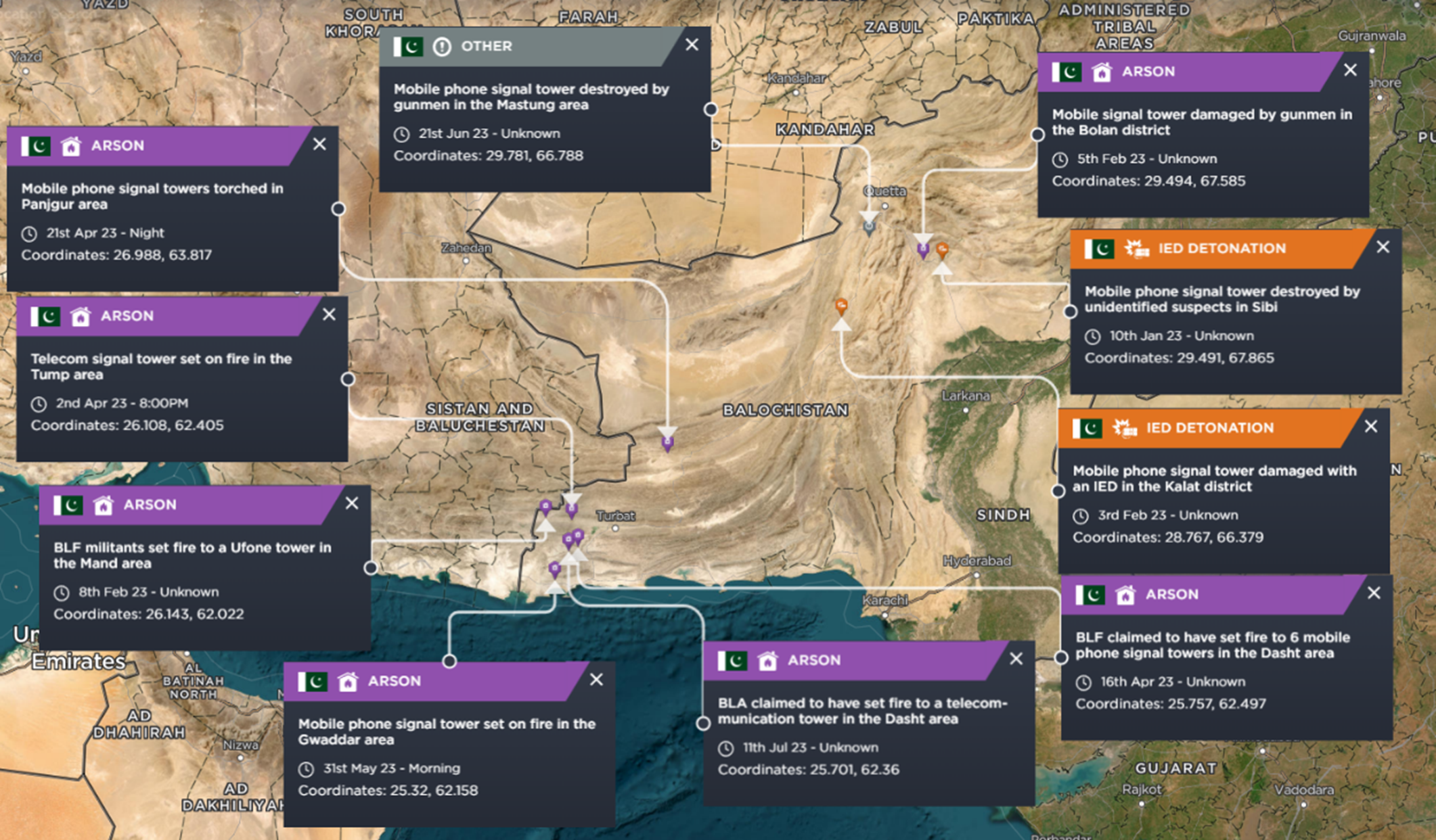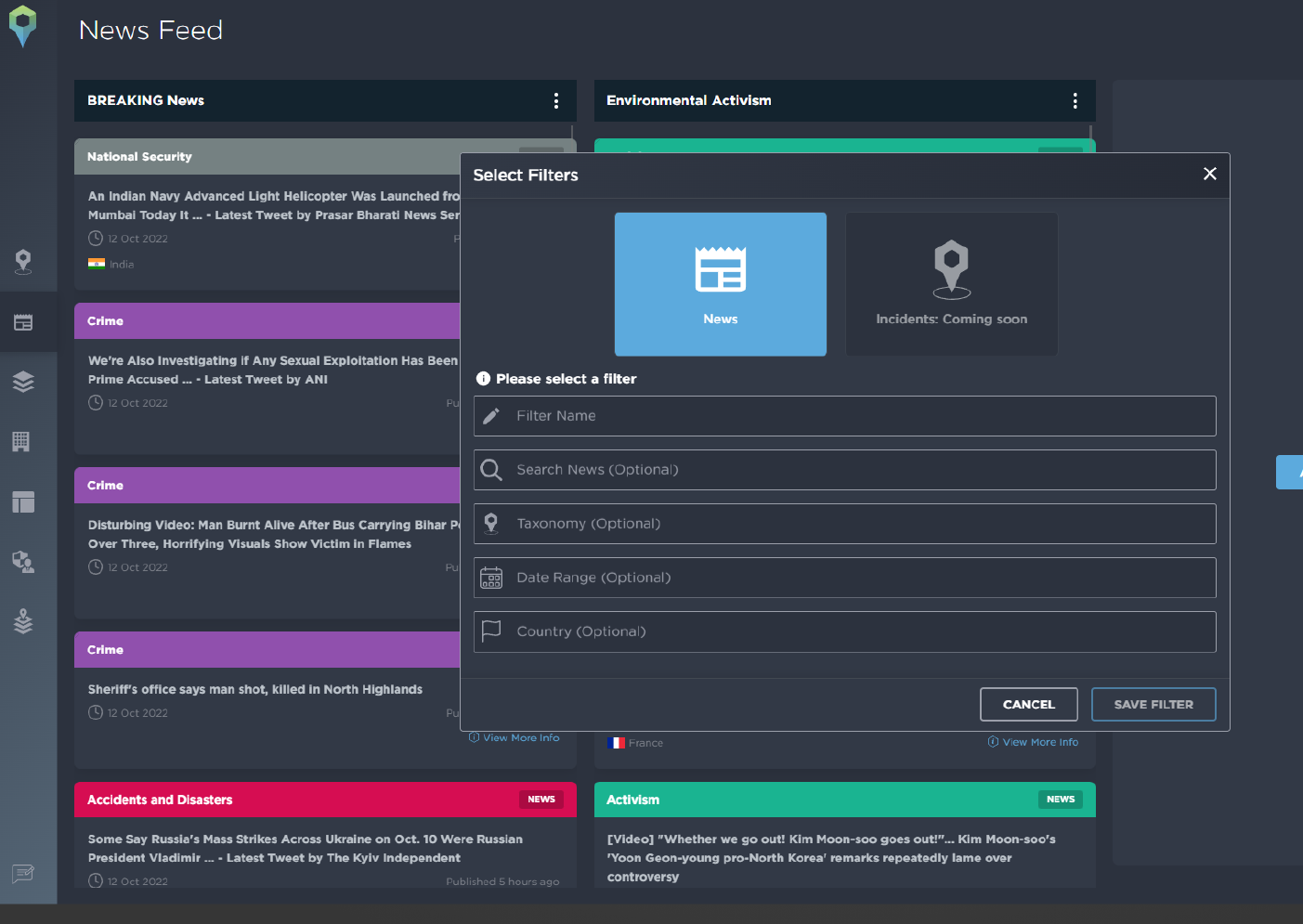Manipur Violence: Ethnic clashes, riots and killings
There have been over 100 days of violence in Manipur. What is the cause? What is the current situation? And what has been the wider impact of ethnic clashes in India's north-eastern state?
After more than 100 days of ethnic clashes in Manipur since May 2023, the state is still witnessing gunfights and killings between the Kuki-Zo and Meitei ethnic communities and state security forces. Hundreds of people including civilians, security forces and militants have been killed or arrested. More than 60,000 people have been displaced from the state and taken refuge internally and in adjoining states.
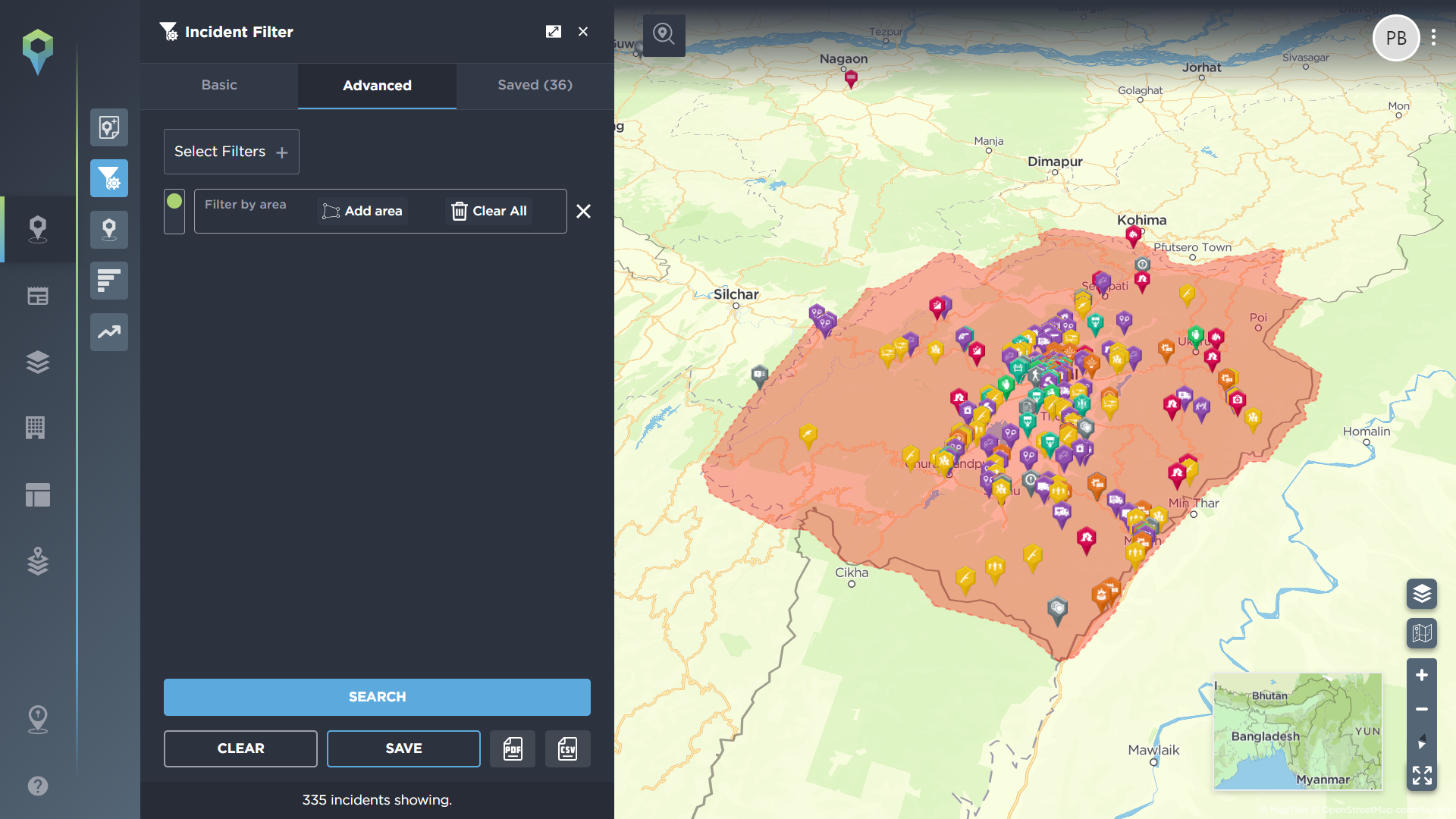
The state of Manipur highlighted via the 'draw area' tool on the Intelligence Fusion platform. All incidents to have taken place in the area are displayed as part of this filtering tool [image source: Intelligence Fusion]
What has caused the violence in Manipur?
Ethnic violence between the Kuki-Zo and Meitei communities has been brewing for some time in Manipur, with the ‘Right to Land’ a principal cause, among others, for the spark of violence.
The Meiteis are non-tribal ethnic people native to Manipur, comprising 65% of the total population of the state of Manipur. The Manipur Kingdom was merged into the Indian Union in 1949 after the country’s independence in 1947. Since then, the Meiteis have been demanding the restoration of their lost identity and tribal status which prevailed before the merger.
The Kuki-Zo encompasses ethnic tribal clans present in the northeast states of India as well as in Bangladesh and Myanmar. Around 50 tribes of the Kuki clan are identified as Scheduled tribes in India. They represent about 16 % of the population.
Manipur’s geography is divided into hills and valleys. The valleys are surrounded by hills from all directions and only consist of one-tenth of the geographical area. Meitei, who constitute the majority of the population of the state, live in the valleys, while numerous tribes including Kuki inhabit the hills. According to Article 371C of the Indian Constitution, under the Manipur Land Revenue and Land Reforms Act 1960 (Parliamentary Act) – Section 158 prohibits the transfer of tribal land to non-tribal people in Manipur. This means Meitei are not legally entitled to own land or settle in the hills. Hence, nine-tenth of the state’s area is reserved for the scheduled tribes.
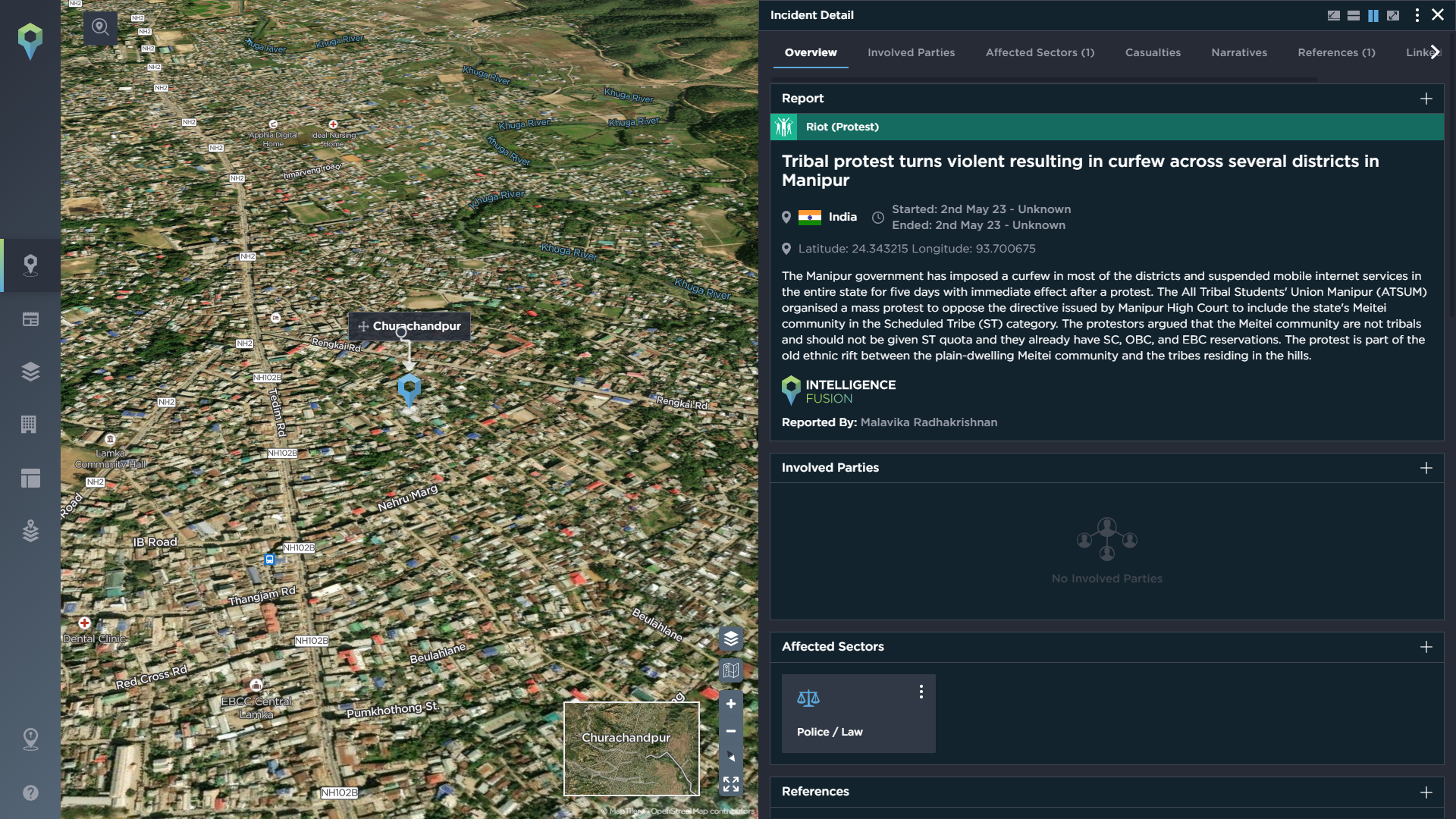
Tribal protests in early May 2023 sparked the violence in Manipur that continues to the time of writing [image source: Intelligence Fusion]
In February 2023, ethnic violence in Manipur started to simmer after Chief Minister Biren Singh’s BJP-led government started an eviction drive without rehabilitation in Kuki-dominated villages claiming it as reserved forests. The government also withdrew from the Suspension of Operations (SoO) agreement tripartite peace process between Imphal, New Delhi, and the Kuki armed groups which has been extended over the last decades to maintain peace between communities. Ethnic Kukis have also accused the government of attempting to justify their eviction and inflaming the situation by reportedly describing Kukis as illegal immigrants and systematically targeting them over poppy cultivation.
Following this, on 3rd May 2023, heavy clashes broke out following a ‘tribal solidarity march’ organized by the All-Tribal Students’ Union (Manipur) protesting the High Court order in support of the 10-year-long demand of the Meitei community to be added in the Schedule Tribe category. The Schedule tribe status would allow the non-tribal Meitei community to strengthen their already favourable position in the state. This would also allow the Meiteis to acquire land in the hilly areas of Manipur which was predominantly Kuki and other tribal group dominated areas.
Increasing tension and insecurity between both communities has resulted in a cycle of violence. As shootings, arson attacks, vandalism and a series of notably violent deaths led to serious unrest and a deterioration of law and order, the Manipur governor on 4th May, 2023, issued a shoot-at-sight order in extreme cases of uncontrolled violence.
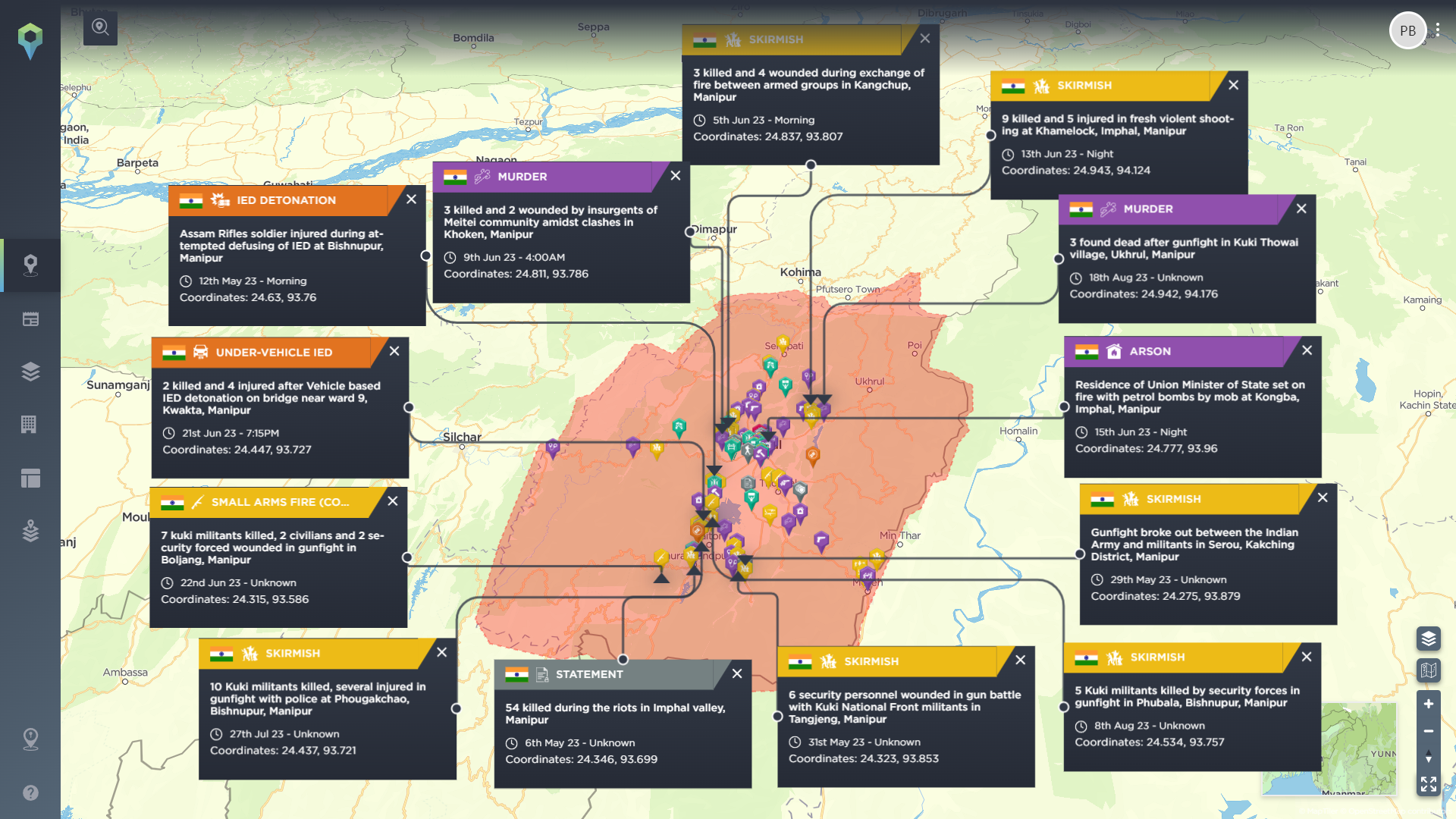
A selection of some of the violent incidents that have taken place in Manipur since the start of May 2023 [image source: Intelligence Fusion]
The effects of violence in Manipur
Vehicles, residences, businesses, police stations and places of worship have been vandalised and torched. Minor bombings and violent attacks are widespread. Significant cases of human rights violations and violence against women have also been reported. One such incident occurred on 4th May 2023, where two Kuki women were paraded naked and gang-raped, footage of which caused significant outrage and large-scale demonstrations across India. After a short pause in shootings, the latest incident was reported on 18th August 2023 about the killing of three Kuki tribals by armed extremists.
Thousands of weapons were reportedly stolen from government armouries and police stations and several cases of arms smuggling have been reported. Several weapons and ammunition caches have been recovered across Manipur. Security forces have been conducting operations in the state destroying illegal bunkers which were set up by both communities in adjoining areas of the Kuki and Meitei villages to defend attacks.
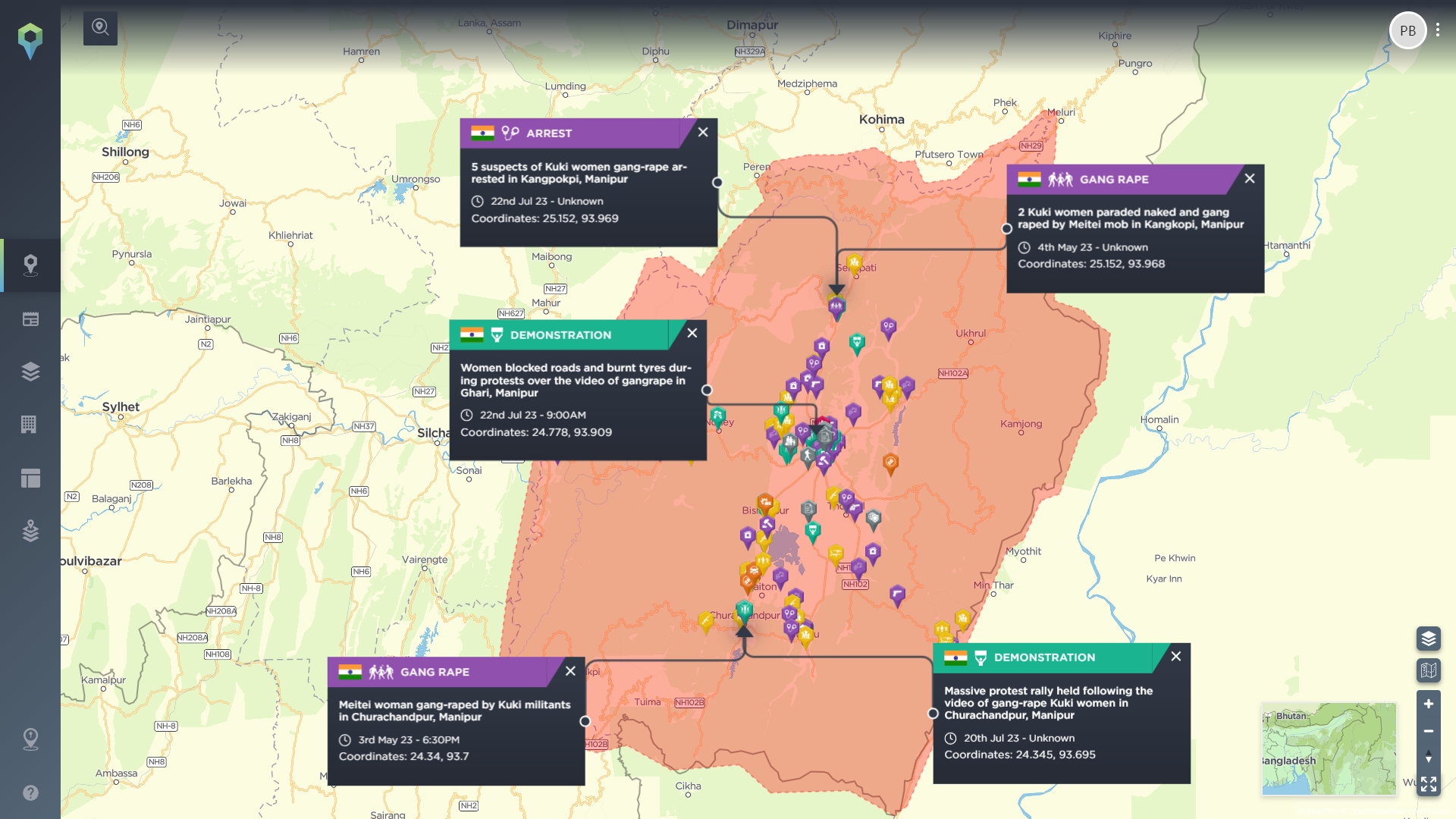
The violence in Manipur has included human rights violations and violence against women. Footage of two Kuki women being paraded naked and gang raped in May 2023 caused outrage across India when it was spread online in July 2023 [image source: Intelligence Fusion]
Following a complete ban imposed by the government, internet services in the state have been restored in several areas with restrictions on mobile internet operations. However, transport disruption is still occurring. The Committee on Tribal Unity on 21st August 2023 has reimposed blockades on two major routes – NH-2 and NH-37, two national highways connecting Manipur with the rest of India. Reports suggest the movement of 171 trucks with essential items were transported and movement of traffic was facilitated through NH-37 (Imphal-Jiribam) road – however, the roadblocks on NH-2, which links Imphal with Nagaland’s Dimapur, by the tribal outfit continued. The movement of people has been severely impacted due to the blockade of traffic on NH-2.
The committee have demanded supply of adequate essential commodities to Kuki-Zo communities in hill areas of Manipur. The economic blockade of highways by Meitei groups is preventing essentials, including medicines and food from reaching Kuki-dominated areas like Churachandpur. The scarcity of essential items and medicines has created desperation amongst local civilians of both communities.
Supply chains have also been disrupted due to the blockades, causing high transportation costs and delays. This affected businesses and livelihoods of both communities. Since Manipur also depended on imports from Myanmar, these disruptions have forced businesses, shops and enterprises in the community to forcefully shut down and they are unable to restart their operations. As supplies have declined, the prices of the essentials have increased causing inflation. Arson and vandalism directed at businesses owned by members of the involved communities has also been widespread.
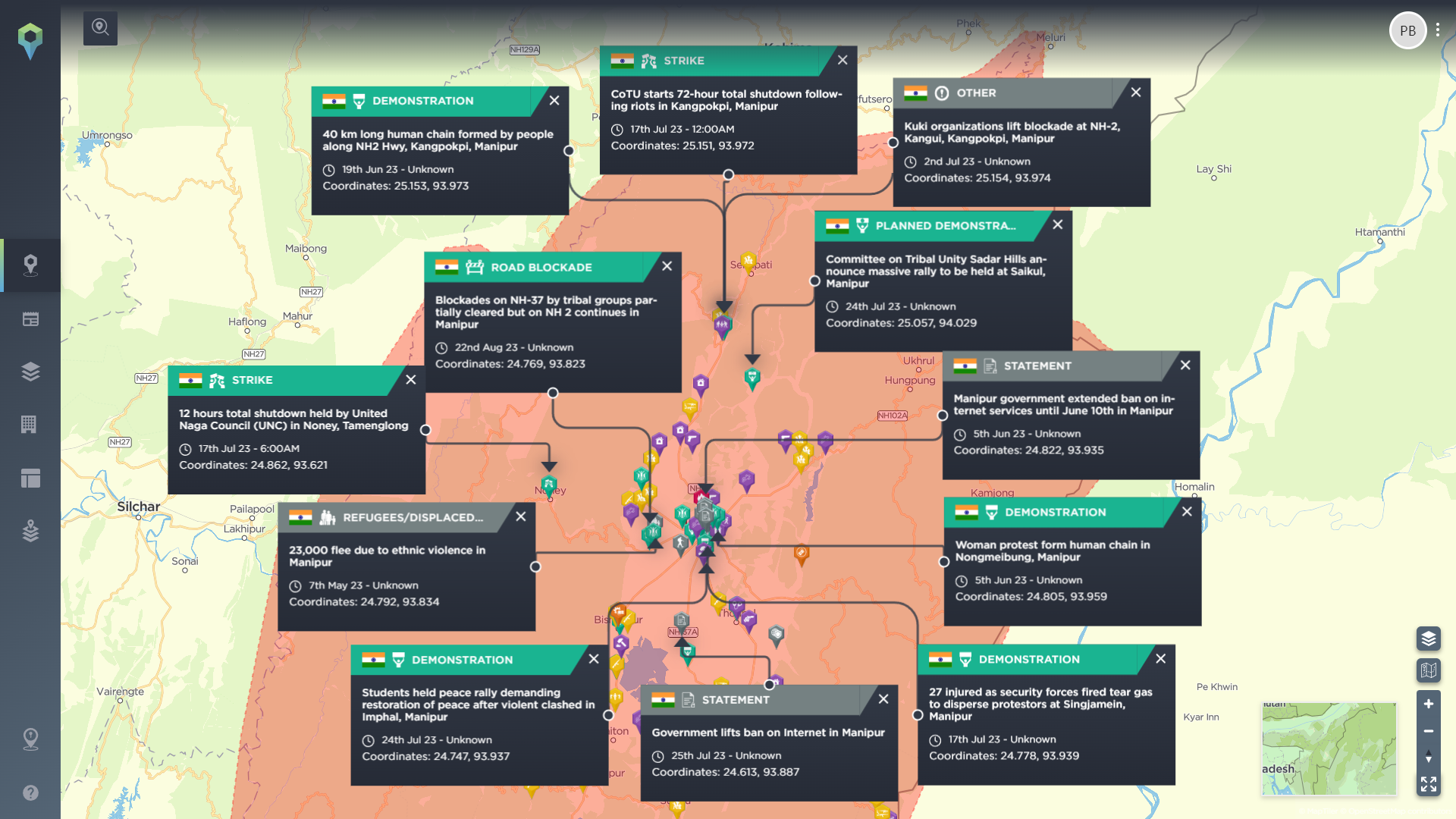
Blockades and internet shutdowns have caused significant disruption and economic damage amidst the violence in Manipur [image source: Intelligence Fusion]
These restrictions in mobility, communication business, education, and medical and government services have also caused economic loss. Textiles, agriculture, and tourism constitute the major sectors of Manipur’s economy. About 80% of Manipur’s exports involving handwoven textiles, medicinal plants and food items have declined. The conflict has stifled Manipur with economic failure, loss of financial investments and human capital.
India’s economic stability suffers a detrimental impact from internet shutdowns. As per reports of Internet Society, a global non-profit organisation, the unavailability of internet connections in Manipur and Punjab claimed a loss of around USD 1.9 billion in total impacting over 21,000 jobs and nearly USD 118 million in Foreign Direct Investment in India.
Responses to the violence in Manipur
The government has deployed additional security forces of approximately 147 Army and Assam rifles units (paramilitary forces responsible for counterinsurgency and border security in Northeast states of India) to tighten security across the state. 127 security checkpoints have been set up across Manipur, more than 2,000 people have been arrested for violations and curfews were imposed to prevent further escalation of violence.
Representatives of the Kuki community have been demanding to hold talks to discuss the mandate for a separate administration for the tribe. The inability of the central government to calm the violence erupting has been a main point of criticism from the national and international community, and widespread protests by several organisations to restore peace in the region have been increasing.
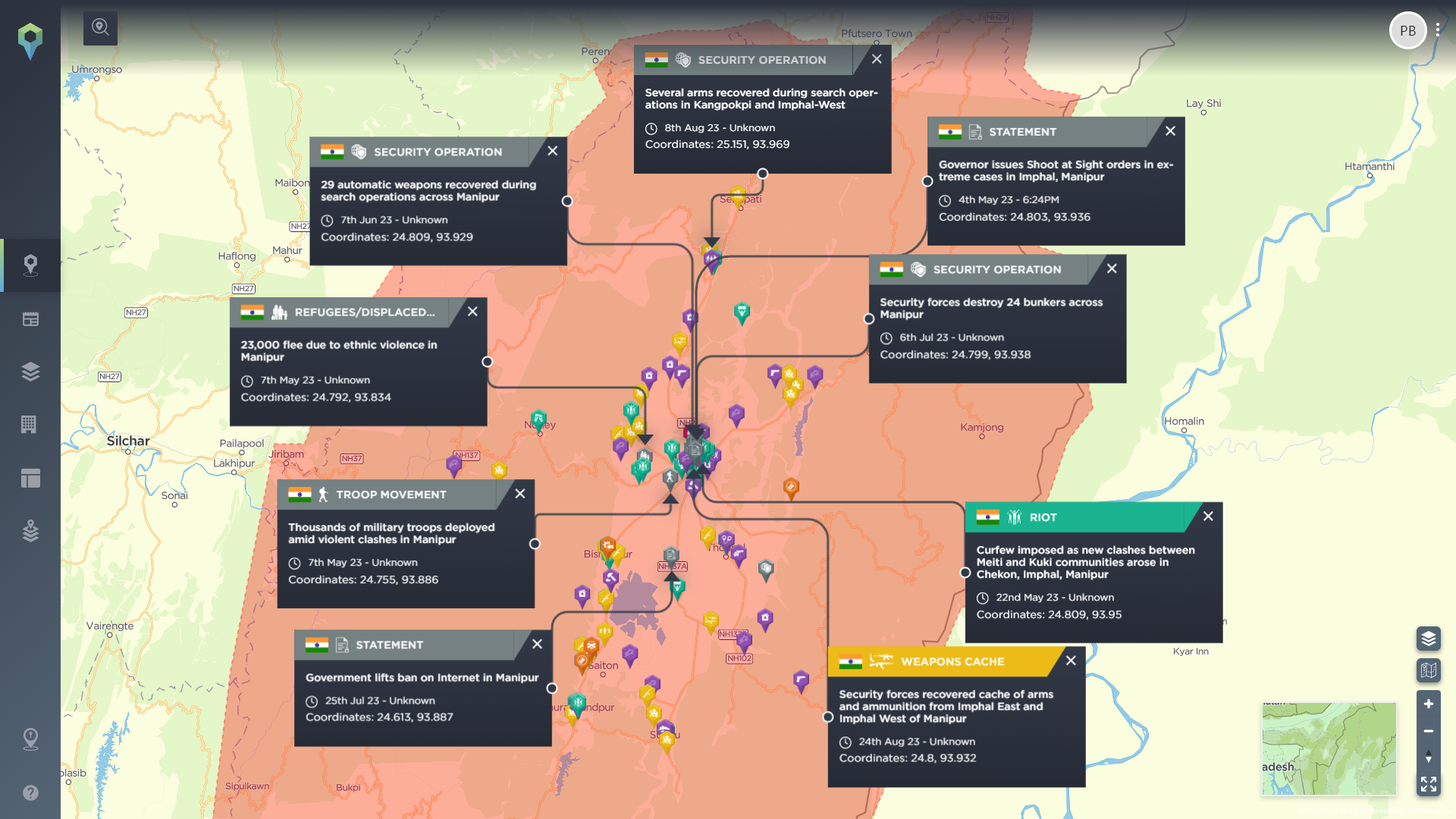
Examples of the security response to the violence in Manipur. Tens of thousands of people have been displaced as a result of the violence [image source: Intelligence Fusion]
Analyst Insight
As the 2024 Indian general election draws closer, the political future of Prime Minister Narendra Modi’s Bharatiya Janata Party (BJP) is also at stake as the Indian government’s framing of northeast Indian states as trade gateways and investment hubs may fall apart. Currently through coalition and otherwise, BJP is the ruling party in all seven north east states in India. As the BJP led government in Manipur completely failed in containing the violence, the ability of the BJP government to regain the fort in Manipur is questionable.
Reports are also discussing the plausible cross-border intervention of China due to strategic vulnerability caused by these internal tensions amongst the community and proximity to the region. The Indian state has previously been concerned about Beijing’s support in promoting insurgency in the northeast. In such a situation an external invention could pose a direct threat to India’s border and domestic security.
The continuation of the violence will prove to have a long-standing impact on the economy of Manipur and the overall economic development of the region. The restoration of businesses destroyed will take a long time given the loss in investments due to the security issues and failure to reach a consensus on a resolution for the internal strife. Any business investments in the region are not advisable until the violence finds a peaceful resolution.
Consistent threat intelligence of the violence will provide significant contribution to prevent human and economic loss. This will help the government to put in place a system or a precaution against the losses caused in the riots and provide better displacement plans or lay out a discussion platform for solutions for the eruption of violence. Continuous threat monitoring in the region will also enable us to predict the developments in the economic environment which will help businesses with strategic planning and provide alternatives for supply chains.
As part of Intelligence Fusion’s monitoring of the situation, all the riots, gunfights, demonstrations related to the ongoing violence have been continuously tracked since the start of tensions in Manipur. All incidents related to the ongoing violence have been reported within 12-24 hours.
As our threat intelligence gathering focus is client-led, fed by the needs of your organisation, intelligence related to any areas of interest will be reported in greater detail and at greater speed – these needs are established as part of an Intelligence Collection Plan (ICP) that subscribers to our platform undergo as part of their onboarding, which is constantly updated over the period of their contract. If you’d like to discuss the needs of your team and your organisation, get in touch with a member of our team below.

